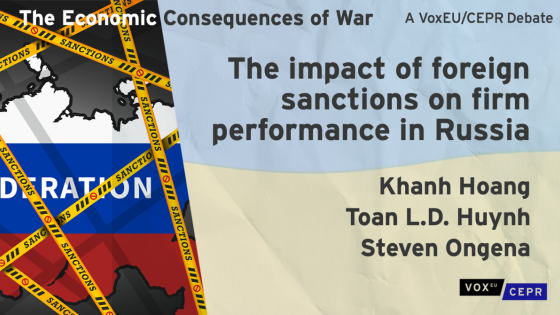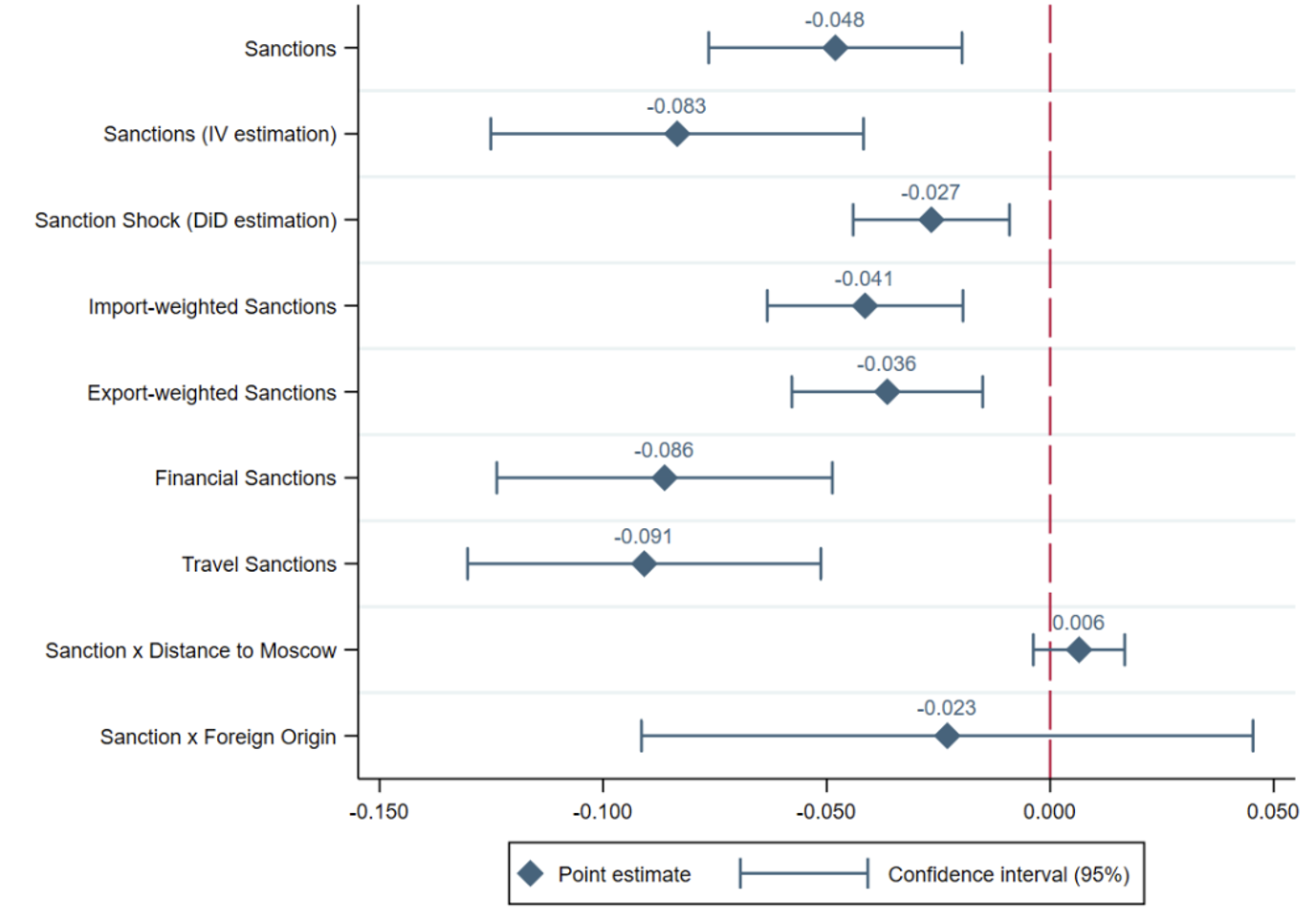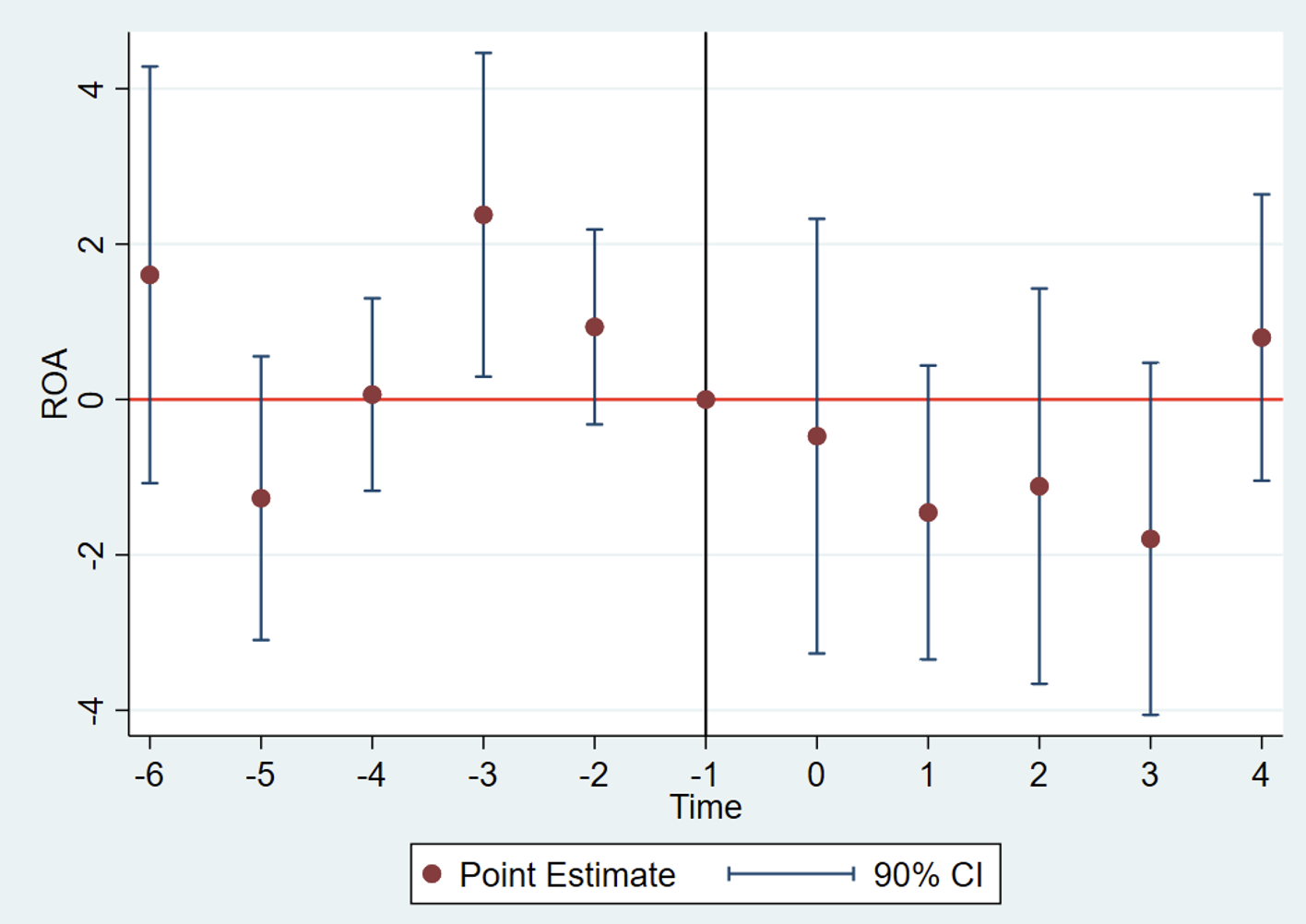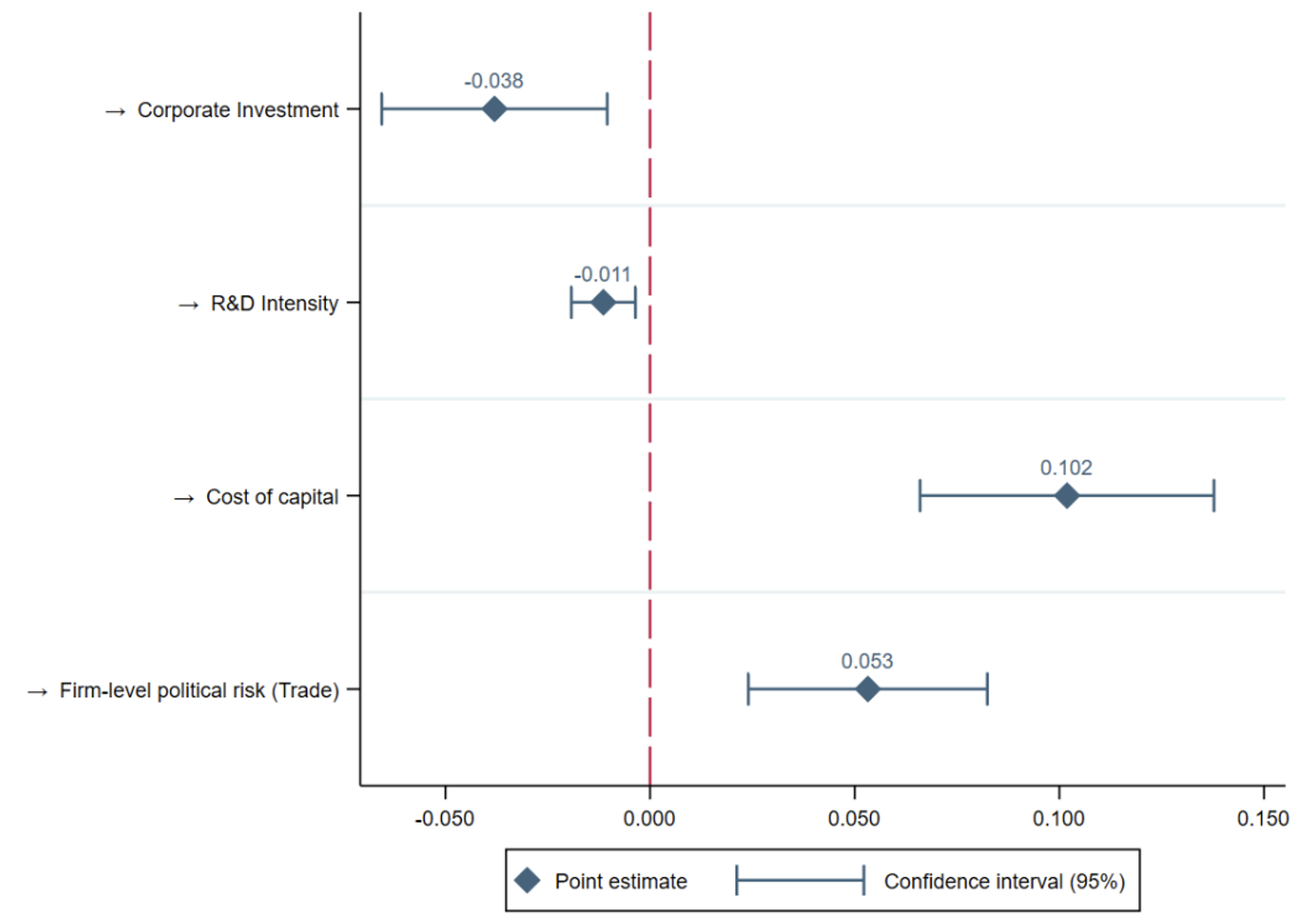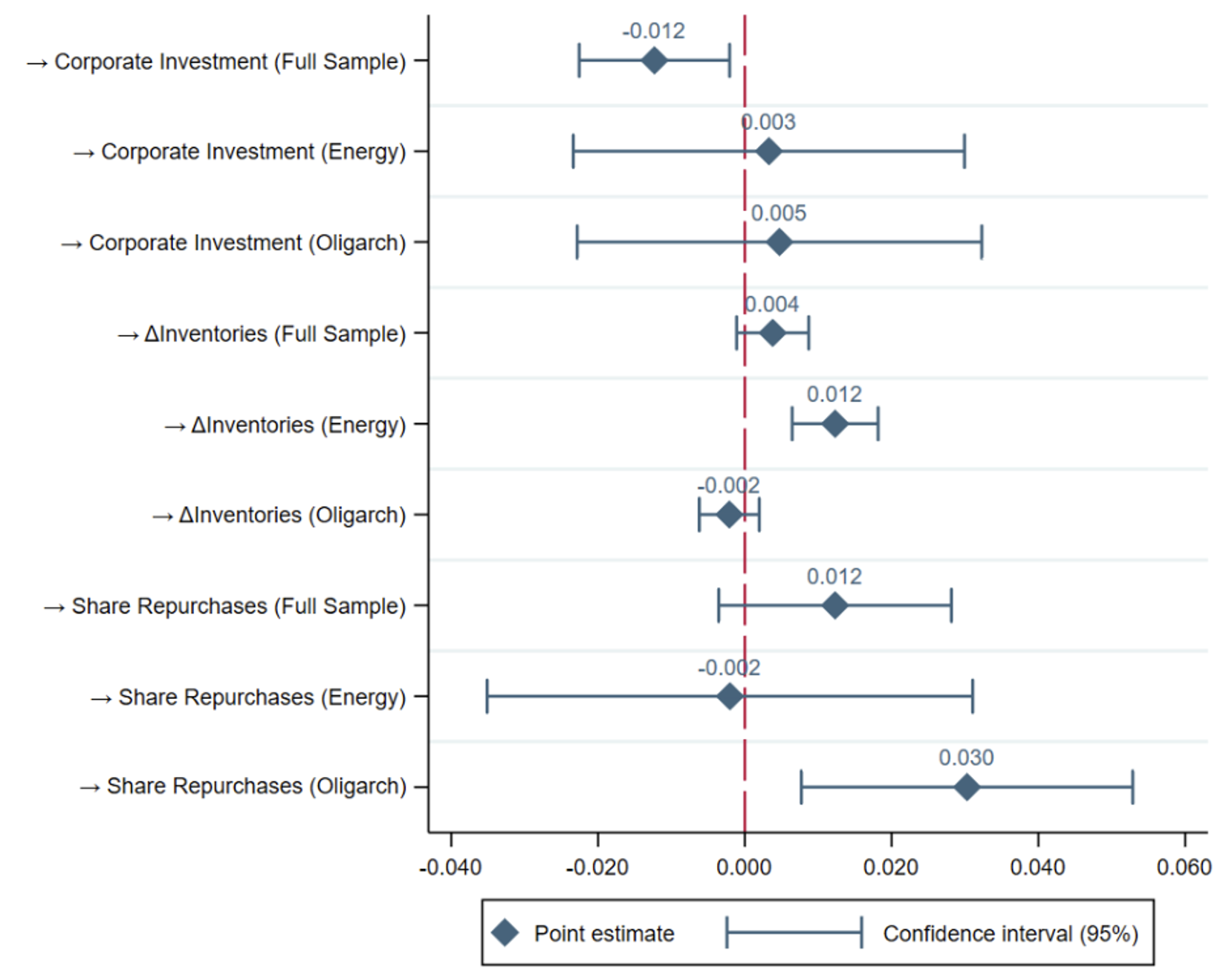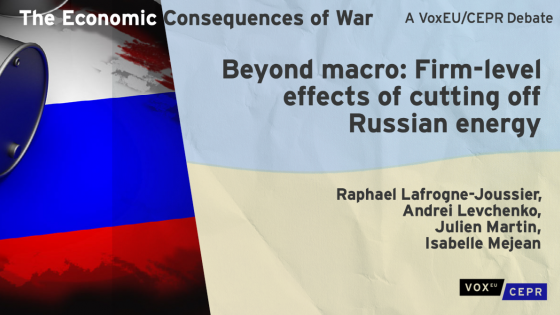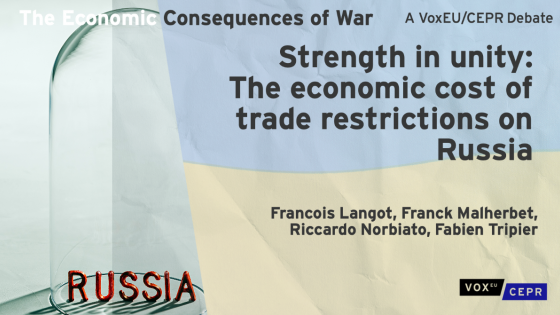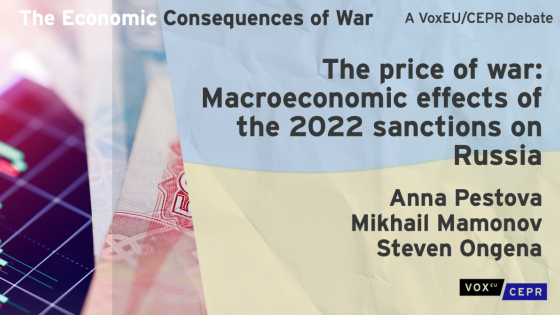Editors' note: This column is part of the Vox debate on the economic consequences of war.
The effects of the sanctions and restrictions imposed on Russia following its invasion of Ukraine in February 2022 have been discussed extensively here on Vox (e.g. Pestova et al. 2022, Langot et al. 2022, Lafrogne-Joussier et al. 2022). In this column, we extend these discussions by looking back at what happened surrounding the Crimea event in 2014.
For our study (Huynh et al. 2022), we collected data on 788 publicly listed Russian firms during the period 2000 to 2019. Foreign sanction data were gleaned from the Global Sanctions Data Base (Felbermayr et al. 2020, Kirilakha et al. 2021), a dataset of global economic sanctions covering all bilateral, multilateral, and plurilateral sanctions from 1950 to 2019. Regarding our identification strategy, we consider the exogenous shock in 2014 as the critical event to interpret the causal relationship by using a difference-in-differences setting supplemented with a propensity score matched sample. Each observation from the treatment group is matched with one observation in the control group using nearest neighbour matching by their characteristics such as firm size, leverage, market value, fixed assets, and financial constraints so that they are identical in terms of firm-level financial traits. In addition, in our IV approach, we use Ukraine’s geopolitical risk (Caldara and Iacoviello 2022) and the score of Americans’ favourable opinion about Russia (from the Global Attitudes Survey 2019) as instrumental variables.
Russian firms and foreign sanctions
We focus first on the association between a reduction in Russian firms’ performance, proxied by their return-on-assets ratio (ROA), and the number of foreign sanctions placed on Russia during the year (this is the stock of sanctions in place, rather than the flow of new sanctions). Figure 1 illustrates heterogeneity in the impact of foreign sanctions on Russian firm performance. To begin with the first line, a one standard deviation change in the number of foreign sanctions (which equals almost 20) decreases the ROA by 3.4 percentage points – a large effect equal to almost 30% of the ROA’s standard deviation. The points represent the parameter estimates (after controlling for firm characteristics and macroeconomics determinants) and the lines the 95% confidence interval revealing statistical significance. The more negative the parameters, the more negative the impact on Russian firms’ ROA; and the broader the dashed line, the lower the statistical significance.
Figure 1 The impacts of foreign sanctions on Russian firm performance
After implementing the identification strategy as mentioned earlier, we provide causal inference for the sanctions-firm performance after validating the instrumental variables by Olea and Pflueger (2013)’s F-test, Kleibergen-Paap weak identification test statistics, Anderson-Rubin Wald test and confidence interval, and Hansen-J over-identification test statistics. Our coefficients of impacts of foreign sanctions are significantly negative, implying a causal effect of sanctions on Russian firms’ performance.
When looking at different types of sanctions such as financial sanctions, travel sanctions, and trade sanctions (including import-weighted and export-weighted sanctions), there is heterogeneity in impacts on the firms’ performance. Travel sanctions exhibit the highest negative impact due to their earliest imposition on the Russian economy and due to the highest number of sanctions from Western countries in this category. Concomitantly, while trade sanctions have been varying across time, the travel and financial sanctions have persisted.
Russian ‘shields’? No effect of distance or origin, but energy and oligarchs do ‘shield’
We start with political proximity to the Kremlin because we formulate the hypothesis that firms close to the Kremlin may be shielded from the sanctions. We measure the physical distance to the Kremlin (Moscow) and test whether geographical location matters for the impact of foreign sanctions on firm performance. We provide evidence that the distance to Moscow on the sanctions-firm performance nexus has no impact (line 8 in Figure 1). The second test is based on firm origin to see what could further shield firms from being affected. The results indicate that being of foreign origin does not help firms suffering from a reduction in firm performance.
One of our highlighted findings is that foreign sanctions leave energy firms in Russia seemingly unaffected but do undermine firm performance in the other (non-energy) sectors. Observing the ROA of those firms during the 2014–2019 period (illustrated from Time 0-4 in Figure 2), we see that there was a slight decline in ROA compared to the previous period; however, the trend is not clear. The joint significance of all estimated coefficients of the post-2014 period do not reject the hypothesis, implying a null effect of economic sanctions on energy firms following the sanction shock in 2014
.
Figure 2 The effects of sanctions on energy firm performance with base-year (2013)
Moreover, we hand-collect data for firms that are related to Russian oligarchs who have connections to Putin following the “Putin list” provided by CNN, resulting in 21 firms with those oligarchs as founders or major shareholders. Among these 21 firms, only six are energy firms. Using the sample of those firms, we find that foreign sanctions do not have a significant impact on their performance. Our findings related to energy and oligarch-related firms suggest the presence of a shield protecting those firms from the negative impact of foreign sanctions.
Mechanism exploration and preparedness for sanctions
We set up an empirical model to figure out how firm characteristics are associated with the number of foreign sanctions, illustrated in Figure 3. We find that, on average, Russian firms invest less in both capital (down 2.6%) and R&D (down 1.1%) and bear a higher cost of capital (up by almost 2%) under increasing foreign sanctions. As a large portion of foreign sanctions placed on Russia are in the form of financial or trade sanctions (or both), it increases uncertainty, thus hindering corporate investment and causing more market frictions.
Figure 3 The mechanism of foreign sanctions on firm performance
We hypothesise that Russian firms may have been prepared for the Crimea event. There are four arguments for this based on our analyses, summarised in Figure 4. First, trade flows in Russia increase significantly in 2013 consistent with stockpiling behaviour, which is also supported by other literature (Aidt et al. 2021). Second, Russian firms in general retrenched investment by 4.3% in 2013 in response to foreign sanctions, but oligarch-related and energy firms did not. Third, energy firms increased their inventories by 3.3%, a 20-fold jump from the average yearly increase over the 2000–2012 period (when inventories were kept steady for all practical purposes). Finally, Russian oligarch-related firms repurchased 3.0% of their outstanding shares in 2013 on average in comparison to other firms, an amount which is three times higher than the yearly average of the 2000-2012 period. This suggests that those (energy and oligarch-related) firms may have had an information advantage and did prepare, neutralising the impact of later sanctions on their performance.
Figure 4 The preparedness of energy and oligarch firms for the Crimea event
Interestingly, we also find similar abnormal patterns of changes in inventories of energy and oligarch-related firms in 2021 relative to the 2015–2020 period, while the magnitude of inventories is much smaller in other firms. As Russia invaded Ukraine in early 2022, these patterns imply the preparedness of Russia firms as they sense the possibility of an upcoming war.
Discussion
Our study assesses the economic effects of almost two decades of recent sanctions on Russian firms. We find that foreign sanctions seem to undermine firm performance in general; however, there is no clear impact on Russian energy and oligarch-related firms. We provide evidence that Russian firms’ cost of capital and political risk increases with foreign sanctions, and that corporate investment and R&D intensity decreases somewhat. In sum, sanctions did have some impact on Russian firms, but the effect was rather small and mostly missed the most important sector of the Russian economy (i.e. the energy sector) as well as oligarchs’ wealth. Interestingly, we find that Russian energy and oligarch-related firms were seemingly prepared for the Crimea event. Although sanctions did generate some economic pain, they may not be enough; “bears simply do not suffer from hibernating during winter”.
A new and much stronger wave of sanctions has now been imposed and the question, “Will they deliver?”, may require a cautious and qualified answer. Given that Russian firms may have been prepared, in the end more than just sanctions may have been justifiably needed to halt and undo this unprovoked invasion.
References
Aidt, T S, F Albornoz and E Hauk (2021), “Foreign influence and domestic policy”, Journal of Economic Literature 59(2): 426-87.
Caldara, D and M Iacoviello (2022), “Measuring geopolitical risk”, American Economic Review 112(4): 1194-1225.
Felbermayr, G, A Kirilakha, C Syropoulos, E Yalcin and Y V Yotov (2020), “The global sanctions data base”, European Economic Review 129: 103561.
Hassan, T A, S Hollander, L Van Lent and A Tahoun (2019), “Firm-level political risk: Measurement and effects”, The Quarterly Journal of Economics 134(4): 2135-2202.
Huynh, T L D, K Hoang and S Ongena (2022), “The Impact of Foreign Sanctions on Firm Performance in Russia”, CEPR Discussion Paper 17415.
Kirilakha, A, G Felbermayr, C Syropoulos, E Yalcin and Y V Yotov (2021), “The Global Sanctions Data Base: An update that includes the years of the Trump presidency”, in P A G van Bergeijk (ed), Research Handbook on Economic Sanctions, Edward Elgar, Cheltenham.
Lafrogne-Joussier, R, A Levchenko, J Martin and I Mejean (2022), “Beyond macro: Firm-level effects of cutting Russian energy”, VoxEU.org, 24 April.
Langot, F, F Malherbet, R Norbiato and F Tripier (2022), “Strength in unity: The economic cost of trade restrictions on Russia”, VoxEU.org, 22 April.
Pestova, A, M Mamonov and S Ongena (2022), “The price of war: Macroeconomic effects of the 2022 sanctions on Russia”, VoxEU.org, 15 April.
